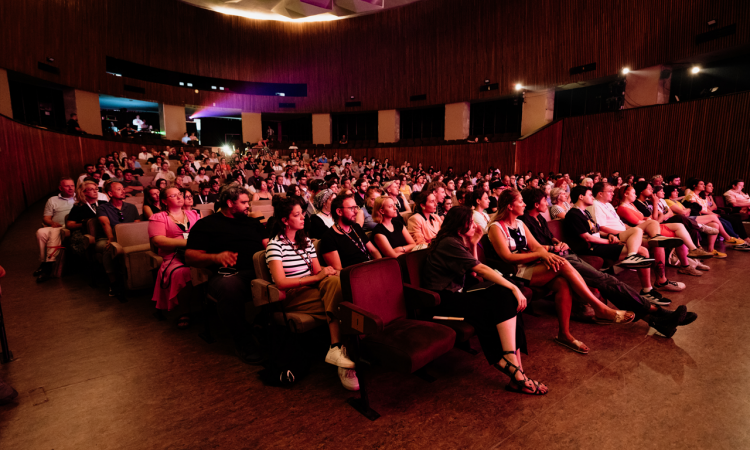Objave
Elia Suleiman at Masterclass: If I Lose My Sense of Humour, I Lose Hope
Palestinian director, screenwriter, and actor Elia Suleiman received the Honorary Heart of Sarajevo at the opening of the 30th Sarajevo Film Festival.
He was honored for his exceptional contribution to the art of cinema, a contribution he elaborated on during a masterclass held at the Bosnian Cultural Center.
"My love affair with Sarajevo was mutual until this morning. I thought this masterclass was scheduled for 10 p.m., not 10 a.m. Had I known it was in the morning... I don’t want to complain, but you all woke up this early to hear what this guy has to say!? I really don’t understand you," Suleiman began the masterclass in a humorous tone, showing that his private persona shares the same ironic humour that characterizes his films.
During the masterclass, the Palestinian filmmaker revealed details about his childhood, including how he dropped out of school at 16, spent time with gangs in his hometown of Nazareth, and barely watched films.
"It was a difficult time; I was mainly exploring who I really was. I felt I had a knack for storytelling. I noticed this when I could entertain others with a joke or a story. But I didn’t know what a book was, let alone a film," Elia Suleiman admitted.
During the first four days of the festival, audiences had the opportunity to see nine of his films in the "Tribute to…" programme, including the acclaimed Chronicle of a Disappearance and Divine Intervention, which make up the bulk of this multi-award-winning auteur's body of work.
From today’s perspective, with a respectable filmography behind him, it was surprising to hear that Suleiman discovered his passion for film only after he left for New York. To keep up with conversations with his peers, he read numerous books on cinema, but he still preferred simple, narrative-driven films. Works by directors like Jean-Luc Godard or Michelangelo Antonioni simply didn’t resonate with him. However, watching films eventually opened his eyes.
"In films from all over the world, I recognized details from my hometown of Nazareth. Some of the characters I saw in those films were identical to people from my neighbourhood. I realized how universal film could be," said Suleiman, revealing that Ozu's "Tokyo Story" was the film that inspired him to start directing.
Of course, the beginning wasn’t easy. It took numerous attempts and rejections before he got the chance to make his debut film, which he produced himself—Chronicle of a Disappearance.
"It's boring to talk about production. Why do I have to do this? I only produced the film because no one else wanted to," the director joked before acknowledging the importance of the production aspect. "The good thing was that I had the freedom to explore. If I had had a producer, many things I wanted would have been rejected as unattractive or unprofitable. Being my own producer gave me complete freedom to experiment and learn."
He hopes to have maintained that complete creative freedom to this day. All his films feature a series of unusual scenes, but the filmmaker doesn’t arrive at these ideas easily or quickly.
"It’s not easy for me to find inspiration. There are directors who come up with a new project or idea every day... But I can spend days staring at - nothing. Doing nothing. Waiting for Godot. Believing that something will happen. I try to stimulate my imagination and inspiration in certain ways, but most often, I succeed by doing nothing for days," Elia Suleiman explained his filmmaking process.
In that process, one thing remains constant—he draws most of his inspiration from his own life. Whether it’s something he experienced, saw, or just heard from someone else, every scene in his films, no matter how incredible, has its roots in real life.
And real life has been anything but easy lately. Ongoing conflicts have once again turned his homeland into a place of sorrow and tragedy. An audience member asked how the current situation in Palestine affects him as a filmmaker.
"There is always room for humanity. History has shown that even in desperate situations, people still manage to stop time with the help of humour," Suleiman said, adding his personal perspective. "I’m from Nazareth and live in Paris; I sometimes wonder how I’ll face this question. I only know one thing - if I lose my sense of humour, then I lose hope. For me, humour is a form of resistance, even when the situation is hopeless. If I can use that humour to make at least one person’s situation a little easier, I am extremely grateful."








